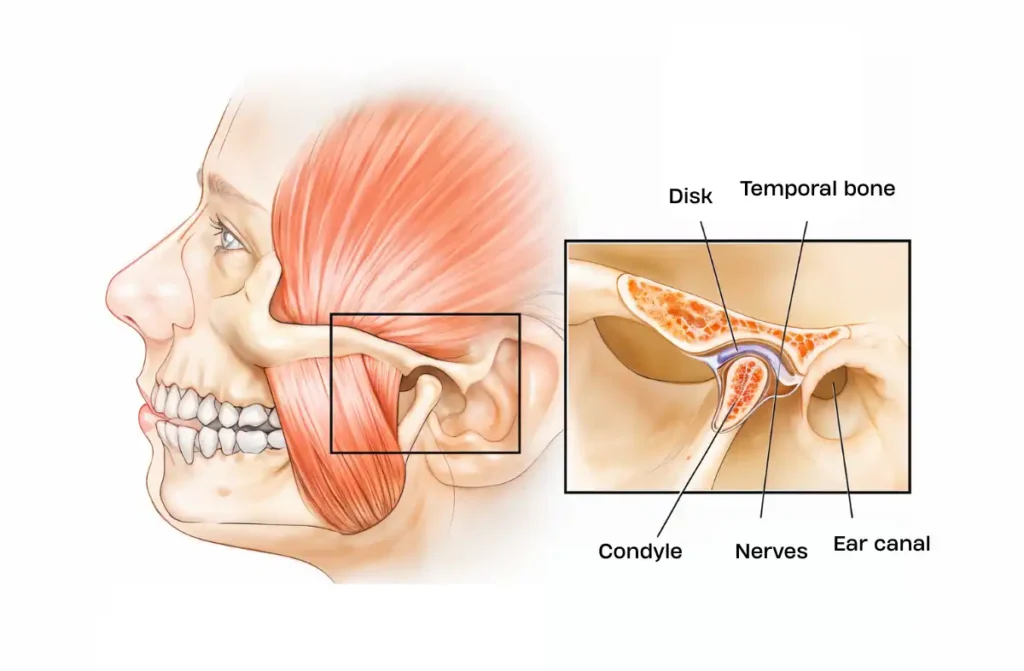Temporomandibular Joint (TMJ) Therapy offers targeted treatment to relieve jaw pain, restore mobility, and improve overall oral health in both children and adults. The TMJ, which connects the jawbone to the skull, plays a critical role in daily functions like chewing, speaking, and swallowing. When this joint becomes dysfunctional or inflamed, it can lead to persistent discomfort, limited movement, and alignment issues. Effective TMJ pain management is essential to prevent long-term damage and enhance quality of life across all age groups. Common triggers include dental misalignment, trauma, stress, and habitual behaviors like bruxism (teeth grinding).
TMJ Disorder Management
Managing Temporomandibular Joint (TMJ) Therapy requires a personalized and multidisciplinary approach to alleviate symptoms, treat root causes, and prevent recurrence. Both children and adults benefit from tailored TMJ disorder management plans that go beyond symptom control.
- TMJ Splint and Oral Appliances: Custom-made TMJ splints and night guards are commonly prescribed to reduce stress on the jaw joint, minimize grinding, and improve bite alignment.
- Physical Therapy and Rehabilitation: Specialist-guided exercises, massage techniques, and ultrasound therapy enhance jaw flexibility and reduce muscular tension. Programs are designed based on the patient’s age and comfort level.
- Medication Support: Anti-inflammatory drugs, muscle relaxants, and pain relievers help manage acute episodes. Pediatric patients receive carefully calculated dosages, while adults may follow long-term protocols.
- Behavioral and Lifestyle Changes: Addressing clenching habits, sleep disorders, and stress through counseling and relaxation technique

Jaw Pain Relief Strategies
Jaw pain caused by TMJ dysfunction can hinder daily activities such as eating, talking, or even yawning. Individualized TMJ pain management strategies ensure lasting relief and improved functionality.
- Custom Orthotic Devices: TMJ splints and repositioning appliances realign the jaw to ease pressure and relax surrounding muscles, offering comfort to both kids and adults.
- Heat and Cold Application: Alternating warm compresses and cold packs reduces inflammation and relieves pain. This method is often paired with other treatments for added effectiveness.
- Jaw Exercises: Gentle, guided movements are introduced to reduce stiffness and encourage proper joint function. Exercises are made engaging for children and structured for adults.
- Dietary Adjustments: A soft-food diet may be recommended during painful phases to reduce joint strain, with guidance to ensure balanced nutrition, Temporomandibular Joint (TMJ) Therapy especially for growing children.
TMJ Therapy Services at Dr. Hari’s Dental Centre
Our Temporomandibular Joint (TMJ) Therapy services are designed to provide full-spectrum care, from diagnostics to long-term maintenance, for all age groups.
- Advanced Diagnostic Tools: We use 3D imaging, digital X-rays, and bite analysis to accurately assess the TMJ and identify the root cause of dysfunction.
- Multidisciplinary Collaboration: Our experienced team includes dentists, orthodontists, physiotherapists, and ENT specialists who work together to ensure holistic TMJ disorder management.
- Age-Appropriate Protocols: Children are treated with gentle, non-invasive methods that suit their developmental needs, while adults may benefit from more comprehensive interventions.
- Ongoing Monitoring: Regular check-ups allow us to track patient progress and adjust treatment plans to ensure continued effectiveness.
Proactive Temporomandibular Joint Care
Preventive TMJ care is just as important as treatment. By addressing risk factors early, patients can avoid complications and maintain optimal jaw function for life.
- Routine Dental Screenings: Regular assessments help detect misalignments and jaw issues early, particularly important during a child’s growth years.
- Sports Mouthguards: Custom-fitted guards protect the TMJ from sports-related injuries, especially in active children and young athletes.
- Sleep and Stress Management: Behavioral therapies and ergonomic sleep aids reduce risk factors such as bruxism and poor posture that contribute to TMJ strain.
- Postural Corrections: Educating patients about proper posture while using devices or reading helps minimize neck and jaw tension, supporting long-term joint health.
Long-Term TMJ Dysfunction Solutions
Effective solutions for TMJ dysfunction focus on both symptom relief and structural correction to ensure long-lasting results for patients of all ages.
- Bite Correction Therapy: Orthodontic treatments and restorative dental procedures realign the bite, relieving undue stress on the joint especially beneficial for growing children and adults with worn teeth.
- TMJ Splint Therapy: Custom intraoral appliances like TMJ splints and night guards are a cornerstone of TMJ pain management, protecting the joint from excessive pressure during sleep.
- Minimally Invasive Procedures: In complex cases, techniques like arthrocentesis (joint flushing) may be performed to relieve inflammation and improve mobility without surgery.
- Patient Education and Support: Empowering families with knowledge about Temporomandibular Joint (TMJ) Therapy, including home remedies and lifestyle changes, encourages active participation in recovery.
Conclusion
Temporomandibular Joint (TMJ) Therapy is a vital service that addresses jaw dysfunction and pain through a blend of diagnostics, personalized treatment, and preventive care. TMJ disorders, if ignored, can lead to speech impairments, difficulty in chewing, and chronic facial discomfort. With expert-guided TMJ pain management, use of TMJ splints, and comprehensive TMJ disorder management strategies, Dr. Hari’s Dental Centre ensures that patients whether children or adults experience lasting relief and improved jaw function. Early intervention and continuous care pave the way for healthier, pain-free lives for the entire family.
Read also: Trauma and Emergency Care.




